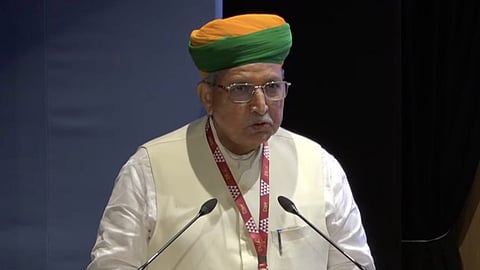
- Latest Legal News
- News
- Dealstreet
- Viewpoint
- Columns
- Interviews
- Law School
- Legal Jobs
- हिंदी
- ಕನ್ನಡ

Minister of State for Law & Justice Arjun Ram Meghwal on Sunday called for Section 34 of the Arbitration and Conciliation Act, 1996, which deals with setting aside of arbitral awards by courts, to be revisited.
He said that he is open to suggestions in this regard.
“Now, after all these days of contemplation, I feel time has come to revisit Section 34 of Arbitration and Conciliation Act, 1996. Do you also feel so? So, if you have suggestions please send it to us, my work will become easier.”
He was speaking at the valedictory session of the Delhi Arbitration Weekend (DAW).
The Minister stressed that strengthening alternative dispute resolution (ADR) was essential to address the pendency of cases in India and to bolster economic growth.
“Business is not going to work without ADR. Cases are pending for a long time, so there should be an alternate dispute resolution mechanism,” he said.
Meghwal pointed to legislative interventions such as the Mediation Act, 2023, the Commercial Courts Act, 2015 and the India International Arbitration Centre Act, 2019.
Responding to criticism that the Mediation Council of India had not been constituted despite passage of the Mediation Act, he assured that the government was “moving very fast” and that “good news” would follow soon.
He reiterated the government’s Viksit Bharat 2047 vision and said that timely resolution of commercial disputes would unlock resources for reinvestment, spur trade and entrepreneurship and help India move from being the fourth-largest economy to the third.
He also emphasised that tribunal reforms must be pursued if India is to meet its economic and legal ambitions.
In his valedictory address, Supreme Court judge Justice Surya Kant said that arbitration’s legitimacy rested on two essential pillars - independence and integrity.
"While independence ensures freedom from influence, integrity assures fairness, transparency, and the confidence of the parties. Without these pillars, arbitration is reduced to a hollow ritual,” he observed.
Justice Kant recalled that India’s statutory framework already embeds neutrality safeguards. Section 12 of the Arbitration and Conciliation Act requires disclosure of circumstances that may raise doubts over impartiality while Section 13 sets out a mechanism for challenges.
However, he emphasised that courts have not stopped at statutory compliance. They have enriched these provisions by ruling that even the perception of bias is sufficient to erode confidence, he added.
He cited Supreme Court jurisprudence holding that an ineligible arbitrator cannot even nominate a substitute and that unilateral appointments by interested parties are impermissible.
“The independence and impartiality of the arbitrator are hallmarks of any arbitration proceedings and even the perception of bias is sufficient to undermine the process,” he said.
Turning to delays, Justice Surya Kant warned that arbitration risks losing its very purpose if it mimics litigation.
“If speed is the soul of arbitration, delay threatens to cripple it entirely,” he said.
Therefore, he batted for stricter case management, tighter control over adjournments and adoption of institutional practices such as model procedural rules and conferences.
On enforcement, he noted that while Indian courts had shown restraint in applying the “public policy” exception under Section 48 for foreign awards, the temptation remained in high-stakes cases for losing parties to seek expansive review.
He cautioned that the exception must be narrowly construed, lest it becomes “a cloak for interventionism.”
He further underlined the judiciary’s calibrated approach:
"Courts must respect arbitral autonomy and maintain minimal intervention, but cannot abdicate supervisory responsibility where natural justice is threatened."
He concluded by calling for a change of mindset within the profession itself.
“Arbitration is designed to be efficient, fair, and final, but when it begins to mimic the worst excesses of litigation, it risks losing its very purpose,” he warned.
Delivering the keynote, Gary Born, Chair of the International Arbitration Practice Group at Wilmer Cutler Pickering Hale and Dorr LLP, traced the history of arbitration. He began with Mesopotamia’s Stele of the Vultures, where a king acted as arbitrator between warring states and a cuneiform tablet recording an arbitral award over water rights.
Born drew parallels across cultures — Greek treaties, the Ramayana, medieval trade fairs, Islamic and Jewish traditions, and early European treaties — to show arbitration’s universality as a method of resolving disputes without recourse to force. He also recalled how arbitration faced setbacks - 19th century US courts that declared arbitration agreements practically unenforceable, the Napoleonic Code’s restrictions in France and authoritarian regimes that outlawed arbitration to protect the monopoly of justice.
He then highlighted the turnaround brought by the Geneva Protocol, the Geneva Convention and the New York Convention of 1958.
Born described the latter as “the global constitutional charter for international commercial arbitration.”
He explained how it made both arbitration agreements and awards valid and enforceable across more than 170 contracting parties subject only to limited exceptions.
Justice Subramonium Prasad delivered the vote of thanks.